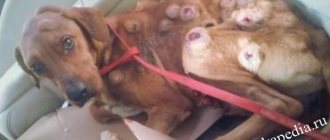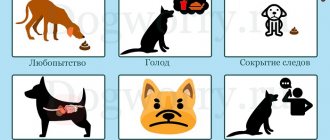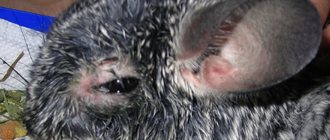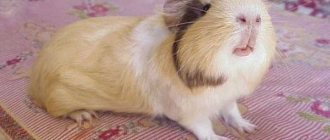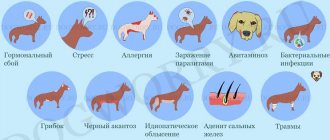The mechanism of gas formation in the dog's intestines
Sources of repulsive phenomena, such as a dog farting, include the following factors:
- air absorption when eating quickly. An animal that is too hungry does not control the process and grabs large pieces;
- gases that are formed during bacterial hydrolysis - the process of processing and breaking down food;
- fermentation that occurs due to improper selection of feed, its low quality or expired shelf life;
- movement of air in the bloodstream into the intestinal tract.
Why does a dog fart
The mixture consists of 99% five components:
- nitrogen;
- oxygen;
- hydrogen;
- carbon dioxide;
- methane
The main composition does not have a specific odor; only 1% of the mixture gives it a repulsive aroma. Its ingredients include indole, ammonia, skatole, short-chain fatty acids and volatile amines: putrescine and cadaverine.
For your information! The volume of these volatile substances depends on the quality characteristics of the diet and intestinal microflora. Each section of the gastrointestinal tract forms a certain amount of them. Most of it occurs in the large intestine, which contains the largest number of microorganisms.
Bloated belly in a dog
The body eliminates gases in dogs through several ways:
- through the anus and mouth;
- by absorption of part into the systemic bloodstream and exit along with respiration;
- absorption by bacteria in the gastrointestinal tract.
For humans, up to 23 releases of a volatile mixture per day are permissible; there is no such data for dogs. Experts note that its volume in young and elderly animals is greater than in middle-aged dogs. The deviation occurs due to the unstable functioning of the digestive department.
Note! A healthy dog expels excess air during defecation or during increased physical activity (it may fart when jumping or suddenly changing body position).
Flatulence accompanies strong emotions - the dog’s joy at the sight of its owner or toy, fear. In contrast to this deviation, flatulence has characteristic symptomatic manifestations that are easy to notice.
Why does a dog fart and pass gas?
There are two terms to explain this phenomenon: flatulence and flatulence. Both of them talk about the presence of gases, but the meanings of these concepts are different.
Flatulence is characterized by moderate release of gases, which accompanies the natural process of digestion. The discharge may be accompanied by strong (or not so strong) sounds, a characteristic odor, etc. The animal at this moment does not experience discomfort, much less malaise. Frequent and abundant passage of gases in such a situation can be caused by the quality of food or overeating. Conclusion: you should pay attention to your diet and adjust it. This condition should not cause concern to the dog owner.
Flatulence is another matter. This is a pathology that differs from the natural process that accompanies the assimilation and digestion of food. Flatulence is characterized by the following symptoms:
- strong rumbling in the stomach,
- swelling (sometimes visible to the naked eye),
- copious discharge of gases with a sour smell, etc.
Diarrhea often occurs. When experiencing flatulence, the animal definitely experiences discomfort and suffers. It is impossible not to notice this. There are many reasons for the occurrence of flatulence. Let's name the main ones:
- binge eating;
- food with a lot of fiber or protein;
- disease of the gastrointestinal tract (intestinal atony, dysbacteriosis, pathology of the pancreas, etc.);
- stress;
- all kinds of neoplasms;
- intestinal parasites;
- constipation;
- allergy;
- intestinal infection.
Some dog breeds are a priori predisposed to flatulence. We are talking about brachycephalic breeds. Such as:
- bulldog;
- Spitz;
- pug;
- Shar Pei;
- chihuahua;
- Pekingese;
- bullmastiff, etc.
That is, all breeds with a flattened nose. The structure of the jaw of such dogs allows them to swallow large amounts of air, which leads to gas formation. The presence of additional causes (quality of food, infections, parasites) significantly aggravates the situation, which leads to flatulence.
The obvious primary signs of flatulence are the frequency of farts and a foul odor. A more dangerous condition is gastric volvulus. In this case, the gases no longer escape, only bloating with accompanying symptoms is observed.
The first task of the dog owner is to establish the cause of the process that has arisen. It is always better to start investigating the problem with food, since this is the most common cause of increased gas formation.
We advise you to read: How to stop a dog from shitting at home
How does food affect gas formation?
Nutrition is the reason you should think about first. Everything matters:
- feed quality;
- feeding regimen;
- conditions for animals to eat, etc.
An excess of substances such as fiber, lactose, carbohydrates and pectin in the feed causes increased gas formation. There is also a separate group of gas-forming products: sunflower seeds, cabbage, legumes, plantain. An excess of such products causes increased gas formation even in a completely healthy animal.
The second reason may be the mixing of different types of feed - natural and dry. The same effect occurs when switching a dog from one type of food to another. Farting in this case will not be a deviation, it is the norm. Over time, the body adapts on its own.
Another common cause is the dog swallowing air. The more air a dog swallows, the more likely he is to fart. Swallowing air occurs when eating quickly, when the animal is very hungry, or if the dog is competing with other pets. Another option is an inconvenient location of the bowl. A high-set bowl encourages a lot of air swallowing.
Large amounts of food also contribute to the accumulation of gas. If a problem arises, it is better to switch to fractional meals.
Changing the diet, conditions and feeding regime can eliminate the disturbing symptoms, i.e., excess gas formation will disappear on its own.
Gas and diarrhea
Gas accompanied by liquid stool may indicate a food allergy, injury, or infection of the gastrointestinal tract. In addition, diarrhea may indicate a helminthic infestation. This condition is dangerous because the body is dehydrated. The animal loses weight, etc. Monitoring is necessary. If the problem does not go away within 2 days, the dog should be taken to the veterinarian.
Parasites
No dog is safe from worms. Puppies are especially susceptible to infection. Since there are different types of helminths, the symptoms indicating their presence also differ in each case. If worms infect the digestive organs, the dog develops severe diarrhea and gas production increases significantly. This is explained by the fact that during helminthalization, parasites throw out the products of their vital activity, which leads to intoxication. The result is bloating. This process is much more complicated, this statement is schematic. Neglected conditions are very dangerous and can lead to the death of the animal.
We advise you to read: Should you brush your dog’s teeth?
Frequent farting in a puppy
When purchasing puppies from professional nurseries, you need to pay attention to their physical condition. If the baby’s belly is swollen, and upon any palpation he begins to noticeably worry, whine, growl or bite, then the future pet has obvious intestinal dysfunction. In order not to have to deal with its treatment later, it is better to refuse the purchase.
Shedding in dogs: why and when it happens
Why does a puppy fart often:
- too early weaning;
- incorrect approach to artificial nutrition in the absence of a female or in her illness;
- constant malnutrition of the weaker puppy, which is pushed aside by larger and healthier brothers;
- Lactose intolerance - all dairy products.
If the puppy farts, squeals, shows his anxiety, and his stomach is rumbling and swollen, then he needs a light massage. After a correctly performed procedure, the baby calms down and relaxes. If, in addition to active gas formation, your pet begins to have diarrhea, then he needs to consult a veterinarian. Diarrhea at a young age quickly provokes dehydration and can cause death.
For your information! Miniature dogs of decorative breeds often suffer from similar bloating and weakness. Their anatomical structure provides for a minimal gastrointestinal section. When overfed, they experience various digestive disorders. To avoid these symptoms, when your Yorkie regularly farts after eating, you need to feed him in small portions.
Flatulence in a puppy
Causes of flatulence in adult dogs
Common primary sources of flatulence include complex carbohydrates, sometimes meat and low-quality offal. The latter contain a large percentage of phenols, indole and various sulfur derivatives. Under some conditions, gas formation in pets is caused by benign foods, but certain conditions must arise for this to happen.
Beans and soybeans
Why does a dog ride on its butt on the floor: what does it mean?
Legumes and soy cause active gas formation in both people and dogs. In many pets, the body is not able to digest and assimilate them normally. If you have been eating such foods from a young age, then over time the gastrointestinal tract gets used to and adapts to their consumption.
Note! Most of the problems involve dogs whose diet has been suddenly changed to include soy or legumes. The absence of a preparatory period and switching to dry biscuits with large volumes of vegetable protein lead to the indicated phenomena.
Gases and parasites
A variety of helminthiases and parvovirus infections are another source of active development of flatulence. Helminthic infestations rarely become a prerequisite for the formation of serious abnormalities in the digestive processes. Exceptions include cases when ignoring the mandatory prevention of parasites leads to the fact that their number exceeds the volume of food received.
Important! In addition to infection by parasitic organisms, the dog may begin to develop malignant tumors. Their aggressive effect on nearby tissues leads to destruction of the intestinal mucosa, serious digestive abnormalities and chronic flatulence.
Intestinal parasites of dogs
Probiotics
The completed course of treatment with antibacterial drugs provokes the death of not only harmful, but also beneficial microflora. Therapy is combined with probiotics, which help restore the balance of intestinal microorganisms. Timely intake of medications allows you to quickly get rid of active gas formation in the gastrointestinal tract and bloating.
Important! For dogs, it is better to buy products in liquid form. Why are such restrictions necessary? Studies have shown that tablet forms restore beneficial microflora more slowly due to the low content of symbionts in the capsules.
Eating on the street and overeating
Eating incontinence often becomes a source of problems for dogs. Some individuals cannot calmly pass by garbage containers and are engaged in eating waste. Such a diet causes fermentation of spoiled food and provokes a deviation when the dog farts very smellily.
The same effect occurs when feeding with leftovers from the master's table. If your dog is lactose intolerant, a small piece of cheese is enough to cause bloating in your dog. Veterinarians are categorically against any handouts; the pet’s diet should consist of products or food specially intended for it, and not human food.
Food incontinence in dogs
Allergy
An allergic reaction to cereals has been recorded in almost 60% of dogs. Attempts to feed them cereals lead to active gas formation with attempts to constantly “let the wind out.” The danger of this syndrome lies in the fact that the transition to normal food is difficult, and normalization of digestion does not occur in one day.
Note! Feeding a dog grains causes chronic bloating, constipation, and severe dysbiosis. A dog fed the wrong food often passes foul-smelling gas and suffers from indigestion with severe diarrhea.
Causes
Any animal periodically farts, that is, releases gases from the intestines. If farting is only an occasional occurrence, then this is quite normal. Gas formation is a purely physiological process that has nothing to do with illness. If your pet farts 1-2 times (or as many times as it deems necessary), there is no need to panic. The animal simply digests food. But, if farting is repeated very often and is accompanied by a foul odor, you urgently need to reconsider the animal’s usual diet and consult a specialist. If you let the situation take its course, the pet can become very ill.
What is farting? In fact, this is one of the stages of digestion. When food enters the intestines, fermentation begins there. It increases with the consumption of certain foods (for example, cabbage, peas, milk). As a result of fermentation, gases are formed in the intestines, which freely exit through the anus of an animal or person.
Farting is a vital process, as the release of gas helps cleanse the body of toxins. If your dog doesn't fart, the buildup of gas in the intestines can cause the intestines to rupture. Therefore, if a healthy dog farts, there is nothing to worry about. However, in addition to purely physiological reasons, increased gas formation may have other prerequisites:
- The presence of pathogenic microorganisms in the animal’s intestines , for example, E. coli. This happens especially often if she swims in open bodies of water in the summer - rivers and ponds;
- Infection with worms . In order to avoid helminthic infestation, it is necessary to regularly carry out anthelmintic treatment according to the schedule recommended by the veterinarian;
- Individual intolerance to certain products . For example, many animals, especially puppies and small toy dogs, fart a lot after drinking milk;
- Pancreatitis is chronic or acute inflammation of the pancreas. Acute pancreatitis usually occurs in those animals that eat food from the owner’s table and are accustomed to begging for tidbits. If the disease is not treated, it gradually becomes chronic;
- Intestinal dysbiosis . It usually occurs in bottle-fed puppies, as well as in those dogs that have been treated with antibiotics;
- Also, eating disorders often occur in pregnant bitches in the last weeks before giving birth.
Forms of flatulence
Why does a dog dig holes in the yard: what to do
Why does my dog fart often? Animals, like their owners, have several types of deviations. Flatulence occurs in acute, delayed and chronic forms. With the last pronounced symptoms, there is no pathology, the general condition of the pet remains at the same level.
The latent course of the disease eventually leads to dysfunction of the pancreas and liver. Impaired functioning of the dog's organs provokes problems with digestion of food and causes increased bloating. The dog's belly begins to resemble a swollen drum. Veterinarians associate this condition with feeding, for example, Labradors and Spitz dogs, cheap industrial feeds based on legumes and soy.
Diarrhea in a dog
The acute course of the pathology is dangerous for the dog. It manifests itself:
- constant anxiety, frequent movement around the apartment;
- whining and trying to attract the owner’s attention;
- a tense and swollen abdomen;
- attacks of vomiting and diarrhea;
- deterioration of appetite, in difficult cases, complete refusal to eat;
- change in gum color to a grayish or bluish tint.
Important! If these clinical signs appear, the dog should be taken to a veterinarian. The clinic will conduct a diagnostic examination that will show the presence of intestinal pathologies and the qualitative characteristics of digestive enzymes.
If a puppy farts
Increased gas production is observed more often in puppies (as well as in older dogs), since the baby’s digestive system is still developing. This shouldn't be scary. Only the general well-being of the pet can be alarming if it has changed:
- temperature increase;
- lethargy;
- loss of appetite;
- diarrhea and vomiting.
This condition can be caused by ingestion of poor quality or age-inappropriate food. For example, if a Spitz puppy swallows a fish bone, the digestive system will react with lightning speed: diarrhea, vomiting, diarrhea, lethargy, loss of appetite, etc. If these symptoms appear, it is better to immediately contact a veterinarian. Before the doctor arrives, you should carefully monitor the puppy, how its behavior changes, and whether other symptoms appear. You must refrain from feeding. However, you need to give something to drink during this period: slightly acidified water (lemon or apple cider vinegar), just clean water, decoctions of anti-inflammatory herbs.
We advise you to read: When does a puppy open its eyes?
Symptoms accompanying flatulence
The accumulation of a large amount of air in the dog’s gastrointestinal tract leads to disruptions in its functioning and causes pain of varying severity. Common symptomatic manifestations of abnormal bowel function include:
- visible increase in volume of the dog’s abdominal cavity;
- excretion of excess through the oral cavity, with parallel hiccups, fetid aromas and attacks of vomiting;
- problems with bowel movements. The animal suffers from constipation or loose stools;
- frequent and loud excretion through the rectum with a sour, putrid or repulsive odor, reminiscent of the decomposition of rotten eggs;
- regular gurgling and rumbling;
- decreased appetite or attempts to refuse food;
- non-standard pose of the pet - constantly hunched over;
- unreasonable anxiety of the dog and search for a comfortable position;
- a sharp decrease in body weight.
Gas formation leads to increased pressure on the intestinal walls with irritation of receptors and pain. When a bolus of food is mixed with gases, foam forms, which covers the internal walls of the organ, causing poor absorption of nutrients. Long-term illness provokes metabolic problems, exhaustion and weight loss in the pet.
The constant presence of a gas mixture in the gastrointestinal tract causes inflammation of the mucous membranes and spasms in the dog. The pathological form of flatulence can become a source of:
- elevated temperature;
- the appearance of particles of blood, pus or mucus in stool and urine.
Important! Some animals may shed eggs and adult parasites in their waste products. Without special therapy, recovery is impossible.
Severe bloating and gas formation
In addition to problems with feeding, more serious reasons can lead to an increase in abdominal volume in four-legged pets. Thus, according to veterinary specialists, acute bloating in the abdominal cavity can be caused by ascites, in which pathological accumulation of fluid occurs in the peritoneum. Dropsy is not an independent disease, but indicates poor circulation, cardiac disease, kidney problems, etc.
Such a severe pathology as peritonitis also leads to sudden bloating. As a result of purulent inflammation of the peritoneum, it is filled with exudate, blood, and lymph. The condition is life-threatening for the animal and requires immediate qualified assistance.
One of the reasons that an owner observes a sudden enlargement of a dog's abdominal cavity is pyometra. Purulent inflammation of the uterus is accompanied by the release of an increased amount of gases. Clinically, the owner observes a sharp bloating of the dog’s abdomen with this dangerous disease.
Numerous helminthiases can lead to acute expansion of the stomach and intestines. Parasites disrupt the production of digestive enzymes, leading to a failure of the absorption capacity of the small intestine, which is accompanied by increased gas formation.
One of the life-threatening causes of a sudden increase in the size of the abdomen is a volvulus of the stomach or a rupture of the wall of the organ. This condition is most often diagnosed by veterinarians in representatives of large breeds. As a result of the rapid filling of the hollow organ with gases, its strong expansion occurs. The enlarged stomach puts pressure through the diaphragm on the heart muscle, which in some cases leads to sudden death in giant breeds.
Considering the seriousness of the reasons leading to bloating, the owner must be able to recognize in which situation it is all about increased gas formation due to foods, and in which condition it can threaten the health and life of a four-legged friend.
Reasons to contact a veterinarian
If your dog farts constantly, and each act is accompanied by a repulsive aroma, then he needs a visit to the veterinary clinic. The doctor conducts a visual and palpation examination, based on the results of which further diagnostics are prescribed. The pet will have to undergo tests for dysbiosis, parasites and blood. In difficult cases, an ultrasound of the gastrointestinal tract is performed, and based on the results of the studies, therapy is prescribed.
Examination at a veterinary clinic
A visit to the clinic with a dog is necessary:
- with severe pain syndrome;
- the appearance of foreign particles in feces;
- elevated body temperature.
Important! Ignoring signs of disease and believing that the animal is normal can lead to serious consequences, including the death of the pet.
Preventing bloating in animals
In order for an animal to stop constantly farting, you must adhere to the following rules:
- normalize nutrition by purchasing good quality food that fully meets the needs of the dog’s body;
- when feeding naturally, reduce the amount of incoming vegetable protein (cereals and legumes), give preference to fermented milk products and beef;
- refuse handouts from your table. Any confectionery, sweets and other delicacies are strictly prohibited;
- increase the pet’s motor and physical activity: walk, play with him longer, do not let him lie down all the time;
- carry out timely prevention of helminths;
- regularly visit the veterinarian for examinations of the animal’s condition;
- If you have a habit of picking up waste, walk him only with a muzzle.
The right choice of diet, timely replenishment of the intestinal microflora with probiotics, frequent walks and timely visits to the veterinary clinic will help reduce the risk of developing flatulence with regular spoilage of the air in the house by foul winds. Ignoring the basic rules of caring for pets can become the root cause of the development of a chronic form of pathology and other serious damage to the gastrointestinal tract.

